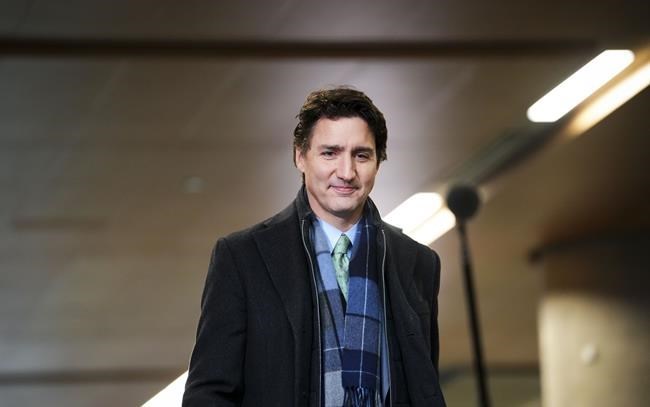NASSAU, Bahamas — Prime Minister Justin Trudeau has arrived in the Bahamas where members of the Caribbean Community are gathering to discuss regional issues, including the deepening crisis in Haiti.
Trudeau left Ottawa Wednesday afternoon to participate as a special guest at the summit of 20 Caribbean leaders in Nassau as the group celebrates its 50th anniversary.
His office said the trip will allow leaders to consider political, security and humanitarian assistance to Haitian people and "Haitian-led solutions to the ongoing situation."
The country has been embroiled in crisis since the July 2021 assassination of prime minister Jovenel Moïse, with violent gangs jockeying for territory in the capital Port-au-Prince and international watchdogs reporting rampant sexual assault, kidnappings and a worsening health emergency.
Haiti's current unelected Prime Minister Ariel Henry, who is expected to participate in the Nassau meetings, has asked for a foreign military intervention. The United States has suggested that Canada lead it.
But the Canadian government has so far kept its powder dry, instead searching for a "consensus" on the ground and levying economic sanctions against elites accused of supporting gang activity.
On Wednesday morning, Trudeau said he was "glad to be invited" to the summit and looked forward to discussing infrastructure, climate change and a "range" of other issues.
"We're also going to be talking seriously about Haiti and obviously regional support, regional participation," he said.
Trudeau said earlier in French that Caribbean nations have a role to play in legitimizing international help for the Haitian people after decades of Western "colonialist" interventions that haven't always worked.
Canada's ambassador to the United Nations, Bob Rae, is also expected to attend the meetings in Nassau. Trudeau dispatched Rae to Haiti in December to assess the situation.
Bahamian Prime Minister Philip Davis told a news conference on Tuesday that discussing Haiti will be a "prominent" priority during the summit, and he urged countries such as Canada and the United States to step up to help.
"We do not have the resources to be able to deal with the Haiti problem ourselves and we do need outside help," he said.
"What we seek to have done is to stabilize the country sufficiently enough to allow for a free and fair election, and the path and journey to that is where the challenge falls."
Davis signalled that the Bahamas would be willing to contribute personnel to a security mission if one is needed, after Jamaica said earlier this month that it was prepared to join an eventual multilateral force.
The Bahamian politician also noted that the West has had a role to play in the escalation of violence in the region, noting that Caribbean nations do not produce firearms. A majority of guns found in the Bahamas were manufactured in the U.S., and there are growing calls for the Americans to clamp down on their weapons exports.
Stephen Baranyi, an international development professor at the University of Ottawa, said that Canada sees a full-fledged military mission as a "last resort."
The best-case scenario, he said, would be for Haitians to come together in a political dialogue that leads to free and fair elections later this year.
But the notion of sending a specialized, time-limited force to assist Haitian police, or sending a larger military force, is being increasingly discussed. Baranyi said Canada could play a leading role in such an effort if it finds partners but is reluctant to work with the U.S. as a main partner because of its history in the region.
"It can't be seen as just going in there alone. It needs backing and participation by Caribbean countries, by African francophone countries," he said.
Emmanuel Dubourg, Canada's only Haitian-born member of Parliament, said in an interview that the Canadian government is "discussing all options" as it considers how to assist the beleaguered country.
"We are trying our best to have that consensus to have a diplomatic solution," the Liberal MP said.
"But we also heard that the national police is under-armed, and the situation (is) really difficult there."
Dubourg added that a discussion about Haiti is likely to play into Trudeau's conversations with U.S. President Joe Biden in March when he is expected to visit north of the border.
An American delegation is also attending the Caribbean Community summit, led by the U.S. assistant secretary of state.
NDP Leader Jagmeet Singh also responded to questions about Haiti in French outside the House of Commons, saying that he thinks it's important to work with Haitian people on a way forward rather than "forcing a solution" as a foreign country.
Trudeau was last expected to join the Caribbean leaders at a meeting in February 2020, but cancelled the trip amid criticism of his government's handling of anti-pipeline blockades in Western Canada at the time.
More than two million Canadians travel to the countries represented in the group every year, and Canada's two-way trade with them totalled nearly $6 billion in 2021.
Climate change is expected to be another major topic at the summit. Most members of the Caribbean Community are island nations that are expected to suffer disproportionately from the negative effects of global warming and rising sea levels.
Some tiny islands in Caribbean chains have literally disappeared in the past decade, said Baranyi. It's a "wake-up call" for the international community, he said, and for developed countries such as Canada that have contributed significantly more to the problem.
"We have a special responsibility to pay some of the bill," he said, adding that a discussion of how countries plan to meet UN climate goals is likely to be on the agenda.
The prime minister is expected to return to Ottawa late Thursday evening.
This report by The Canadian Press was first published Feb. 15, 2023.
Marie-Danielle Smith, The Canadian Press



